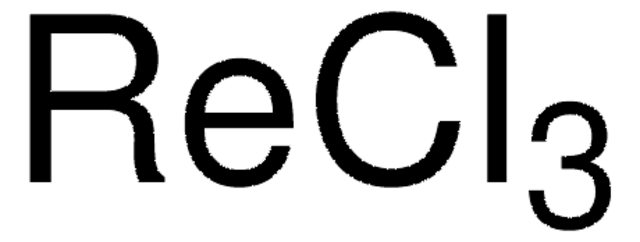520772
Rhodium(III) chloride hydrate
crystalline, ≥99.9% trace metals basis
Synonym(s):
Rhodium trichloride hydrate
About This Item
Recommended Products
Assay
≥99.9% trace metals basis
form
crystalline
composition
Rh, 38-43.5%
reaction suitability
core: rhodium
reagent type: catalyst
mp
100 °C (dec.) (lit.)
SMILES string
O.Cl[Rh](Cl)Cl
InChI
1S/3ClH.H2O.Rh/h3*1H;1H2;/q;;;;+3/p-3
InChI key
HSSMNYDDDSNUKH-UHFFFAOYSA-K
Looking for similar products? Visit Product Comparison Guide
Related Categories
Application
- Rhodium-cobalt (Rh-Co) (a bimetallic catalyst) supported on silica for Fischer−Tropsch (FT) synthesis.
- Rhodium (III) catalyst, N-2-(2,3,4,5 tetramethylcyclopentadienyl)benzyl-(l)-norephedrine rhodium(III) chloride for asymmetric ketone reduction.
- Rh@CTF (covalent triazine frameworks) catalyst for the hydroformylation of 1-octene.
Signal Word
Danger
Hazard Statements
Precautionary Statements
Hazard Classifications
Acute Tox. 4 Oral - Aquatic Acute 1 - Aquatic Chronic 1 - Eye Dam. 1 - Met. Corr. 1 - Muta. 2
Storage Class Code
8A - Combustible corrosive hazardous materials
WGK
WGK 3
Flash Point(F)
Not applicable
Flash Point(C)
Not applicable
Personal Protective Equipment
Certificates of Analysis (COA)
Search for Certificates of Analysis (COA) by entering the products Lot/Batch Number. Lot and Batch Numbers can be found on a product’s label following the words ‘Lot’ or ‘Batch’.
Already Own This Product?
Find documentation for the products that you have recently purchased in the Document Library.
Customers Also Viewed
Our team of scientists has experience in all areas of research including Life Science, Material Science, Chemical Synthesis, Chromatography, Analytical and many others.
Contact Technical Service
















